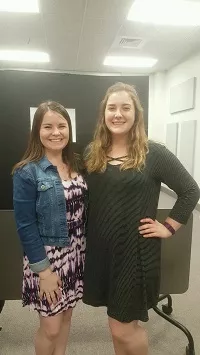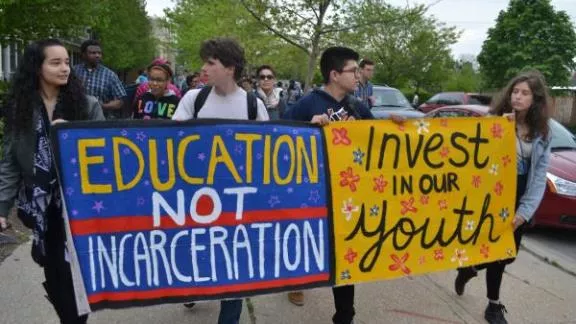
“Many of our preservice teachers had never heard of the pipeline,” say Jessica Spink and Megan Hamilton, president and vice-president of the Arizona Education Association’s student chapter at NAU. “But almost all of us will have students who could be touched by it.”
According to the Arizona ACLU and federal data, some Arizona schools—particularly charters—still embrace discipline policies that disproportionately affect students of color and those with disabilities. In some suburban Arizona districts, American Indian students are up to 30+ times more likely to be suspended than their white peers, while statewide, Native students are three times more likely and African-American students 2.5 times more likely to be suspended.
Shocked by the statistics, NAU student chapter members held a crash course teach-in on the school-to-prison pipeline for NAU College of Education students and early career educators in the Flagstaff school district.
To turn future teachers into effective advocates, the teach-in focused on positive discipline options, including how to influence policy from the classroom. But the highlight was a simulated pipeline that students could actually walk through.
Each person received a card giving her or him the mock identity of a student who was presented with different circumstances, opportunities, or challenges. After stopping at three different stations within the pipeline, where their mock student experienced triumphs or struggles, players saw how easily a student could become entangled and trapped in the school-to-prison pipeline.
Preservice teachers who walked into the teach-in with no knowledge of the pipeline walked out with the resources to identify the signs and break the cycle in their future schools.
“We’re entering a profession where we need to learn how to support every student in our classroom,” says Jessica, explaining why social and education justice is a priority for their student chapter. NAU is not alone. In every region of the country, student chapters and local affiliates are feeling the urgency to organize around social justice issues.
NAU advises student chapters who are interested in holding their own teach-ins to apply for an NEA C.R.E.A.T.E. community service grant and to reach out to their state affiliate student coordinator for support—actions they credit with making their own outreach a success. NAU also took part in Educate to Act, an undergraduate research conference that prepares students to become social justice activists.
“Our political climate is not very friendly toward educators or students,” notes Professor Sarah Fix, faculty co-advisor for the NAU student chapter. “Social justice advocacy creates community and empowers our members to help their students—and that’s a great feeling.”

